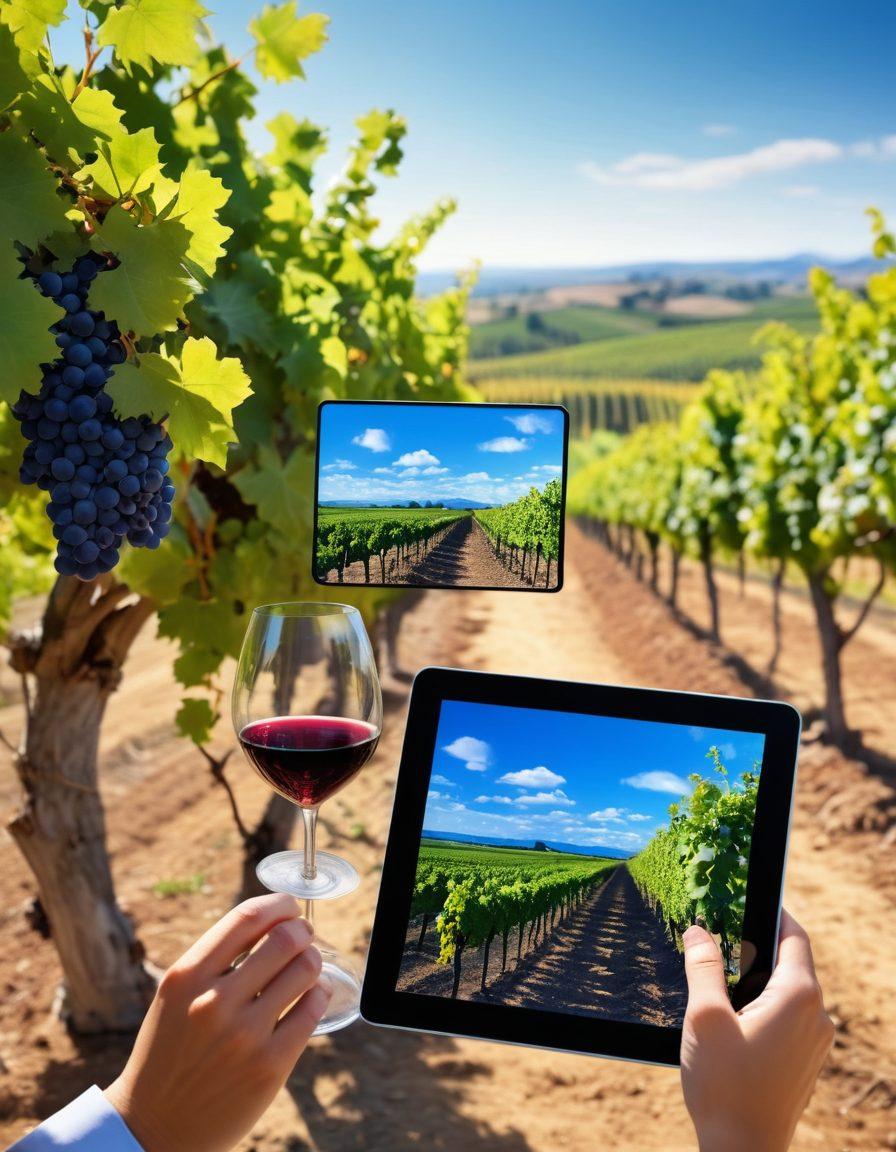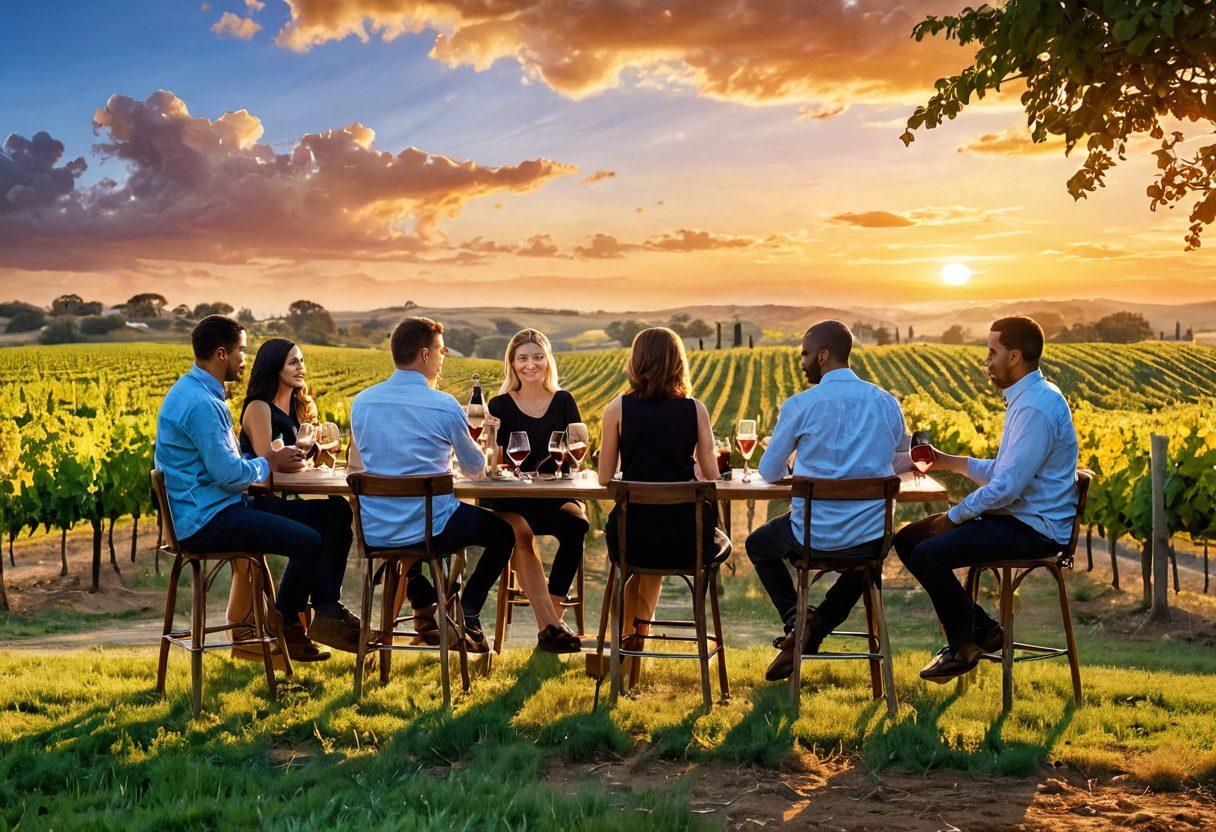Unlocking the Vineyard: How Wine and AI are Revolutionizing Communication for Aphasia Support
In a world filled with thumping hearts and flowing rivers, the treatment of conditions like aphasia often feels like navigating through a dense fog. Aphasia, a condition rooted in language impairment, locks away meaningful thoughts and desires behind walls of silence and confusion. But what if we told you there are innovative ways to cut through that fog? Enter the realm of AI technology and the warm embrace of vino. Yes, wine and artificial intelligence are coming together to enhance therapeutic conversations, fostering social interaction and creating a delightful bridge for those who face the challenges of speech difficulties.
Imagine this: A cozy study filled with the lush aromas of a freshly opened bottle of red, laughter swirling like the notes of a well-aged Merlot. You’re seated with a trained sommelier, who carefully embarks on a healing journey with a client navigating the complexities of aphasia. The gentle artistry of winemaking combines with the empowering techniques of speech-language pathology. The health benefits of wine—when consumed responsibly—open a door to a world of neurorehabilitation. Could this be art imitating life or life fueling the art?
What’s remarkable about AI and wine is their capability to adapt—similar to how a grape evolves into a complex wine with each passing season. Machine learning and natural language processing take center stage, enabling personalized speech interventions. By employing these rehabilitative techniques, clients can engage with sophisticated AI systems that are designed to support their cognitive function and grant them the tools to navigate their language challenges more effectively. Whether it’s pairing notes in a fine Bordeaux or breaking down a sentence into manageable parts for clearer communication, the fusion of vino and AI is revolutionary.
As we delve deeper into this concept, one must wonder how these interactive, AI-driven tools are changing perceptions. Can a fine glass of wine and an engaging conversation rekindle lost confidence and communication skills? The stories shared during these sessions often reveal transformative moments: ‘I never thought I could express myself like this again,’ says a client, holding up a glass, the glint of hope filling their eyes. These heartwarming experiences aren't just about wine; they’re about reigniting the spark of connection.
From Grapes to Guidance: The Innovative Role of AI in Speech Rehabilitation and Support
As I took a leisurely stroll through the picturesque vineyards, I couldn’t help but marvel at the transformation of grapes into exquisite vino. It became a powerful metaphor for rehabilitation. Just as winemaking elegantly balances tradition with innovation, the field of speech rehabilitation is undergoing a similar revolution, thanks to the remarkable advancements in AI technology. With its roots deeply embedded in cognitive therapy and neurorehabilitation, let’s explore how AI is serving as a supportive sommelier in aiding individuals with aphasia and other language impairments. After all, when we stir the right ingredients together, extraordinary flavors emerge.
Imagine walking into a charming wine cellar, each bottle telling a story of a rich heritage. This storytelling aspect is akin to the magic of communication. Those facing speech difficulties often have their narratives stifled, which brings us to a poignant question: How can innovative rehabilitative techniques help restore these lost voices? Here’s where natural language processing and machine learning come into play. By using sophisticated algorithms, AI can analyze speech patterns and tailor individualized interventions that help rekindle communication skills, allowing patients to express themselves with renewed confidence, much like a sommelier choosing the perfect glass of wine to complement a meal.
The health benefits of wine are renowned, but combining that with the therapeutic nature of AI opens up a fascinating dialogue about social interaction. Regular gatherings around a glass of vino can create a supportive environment for individuals with aphasia. Imagine seeing your loved one, who once struggled with speech, now engaging in riveting conversations over your favorite bottle. This social aspect not only bolsters their communication skills but also enhances cognitive function, demonstrating that drinking responsibly can foster connections even in the face of neurological disorders.
As we delve deeper into the role of AI in aphasia support, consider the potential of speech science. The marriage of advanced technology and speech-language pathology is paving the way for responsive and personalized speech interventions. Through rigorous analysis of cognitive function and the unique needs of each individual, AI offers tools that can adapt as quickly as a sommelier recommends a new flavor profile based on your preferences. With such dynamic technology, the conversations about feelings, experiences, and stories become not only accessible but also enjoyable once more.
In a world where machine learning is transforming the landscape, it is crucial to remember the human element in all of this. While AI provides the frameworks and techniques for enhancement, the true magic lies in the relationships fostered through communication. As we explore the intersections of wine culture and innovative therapeutic communication, we discover that the essence of dialogue is our shared humanity. So next time you uncork a bottle, think not just of the flavors, but how this age-old practice can be a catalyst for change in the narrative of someone overcoming speech difficulties. Cheers to that!
Sip, Speak, Support: The Intersection of Winemaking and Advanced Communication Techniques for Aphasia
Imagine a sun-drenched vineyard, the verdant vines bursting with plump grapes, the air alive with the murmurs of laughter and clinking glasses. As we sip fine vino, it’s easy to forget the transformative connections we can foster in our everyday lives - ones that can uplift, inspire, and empower those facing challenges like aphasia. This intriguing intersection of winemaking and advanced communication techniques paves the way for innovative therapeutic communication strategies, and it invites us to explore the rich world of cognitive rehabilitation through the enjoyable lens of social interaction and fine wine.
Aphasia, often a byproduct of neurological disorders, presents unique challenges in communication. Individuals experiencing language impairments and speech difficulties seek avenues to regain their voice. Imagine a sommelier, armed with more than just a vast knowledge of wines; they possess the skills to employ rehabilitative techniques that integrate the sensory experience of winemaking with speech-language pathology principles. Through joyful moments shared over a glass of wine, we can create environments ripe for speech interventions, enhancing communication skills while celebrating the health benefits of wine. Who knew a refreshing glass of merlot could also aid in cognitive therapy?
Hooked onto this idea is the application of AI technology and machine learning, allowing us to refine our understanding of how we communicate. By integrating natural language processing into therapeutic strategies, we can revolutionize how we approach aphasia support. This leads to the creation of personalized speech interventions that resonate more deeply with the individuals involved. If the power of speech science shows us anything, it’s that AI not only aids in understanding language but can also help tailor cognitive rehabilitation techniques to meet personal needs. What if technology could harness the essence of your favorite grape, guiding you back to the words that have seemed just out of reach?
Fostering social interaction through winemaking-related events can serve as an effective backdrop for cognitive therapy sessions. Envision a group of friends or family gathering around a table, sampling various wines, sharing stories, and engaging in laughter, all while practicing communication skills. These moments highlight the beauty of human connection and create an atmosphere where those with aphasia can feel comfortable expressing themselves. With therapeutic communication mingling with conviviality, these gatherings become a safe haven that not only tantalizes the palate but also uplifts the spirit, lowering the barriers of speech difficulties.
As we journey through this fascinating blend of vino, technology, and language support, the underlying message remains clear: drink responsibly. Enjoy the health benefits of wine while prioritizing the well-being and progress of those undergoing speech rehabilitation. So, the next time you lift a glass, consider the deeper narrative unfolding around the table. Could your next sip foster not only a delightful taste experience but also stitch together new threads of communication, hope, and healing for someone facing the challenges of aphasia?


